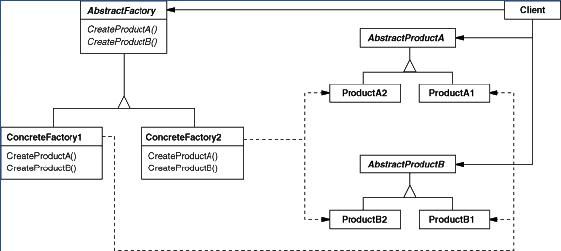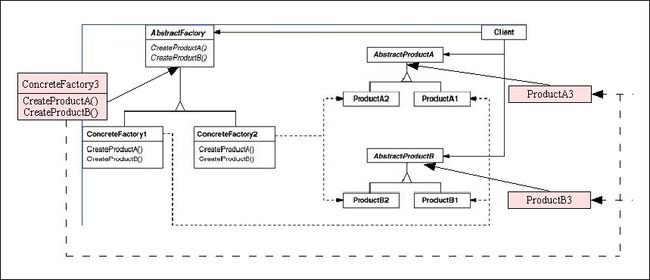设计模式之AbstractFactory模式
设计模式的目的就是尽量减少“变化”对程序的影响,尤其是对客户程序的影响。AbstractFactory模式作为创建型模式的一种,解决的就是“new”在变化中可能引起的问题。先来看看new有何种不好,举个创建汽车的车门的例子:
很自然的一种想法是:Door *door = new Door();
但是如果遇到创建老爷车的车门,创建现代车的车门,这段代码就无所适从了。
OO为我们提供了哪些精华的思想?“封装”,是的,将车门的创建封装起来,于是我们有了静态工厂方法:
客户程序代码:
1
 Door
*
door
=
doorFactory
->
CreateDoor();
Door
*
door
=
doorFactory
->
CreateDoor();
库程序代码:
1
 class
DoorFactory
class
DoorFactory
2

 {
{
3 public:
public:
4 Door* CreateDoor()
Door* CreateDoor()
5

 {
{
6 return new Door();
return new Door();
7 }
}
8 }
}
2
3
4
5
6
7
8
客户程序在此是不会变化的,不管你是老爷车门,现代车门,还是钻石车门,这些和客户程序代码都是没关系的,究竟CreateDoor出来如何结果都交给多态来判断,我们不用操心。
但是库程序代码还是需要更改的,但我们已经将“变化”与客户程序隔离了。
需求又有变化了,不光要创建车门,还需要创建引擎,车灯,而且还是不同风格的。
这时候静态工厂已经应付不来了,静态工厂有其自身的缺陷“不能应对不同系列对象”的变化。
动机:
软件系统中,经常面临“一系列相互依赖的对象”的创建工作。(两个特征:“一系列”,“相互依赖”)
将创建过程封装起来,避免“客户程序”和“多系列具体对象的创建工作”的紧耦合。
意图:
提供一个接口,让该接口负责创建一系列“相关或者相互依赖的对象”,无需指定他们具体的类。(GoF23)
思路:

对于客户程序来说,只依赖于三个抽象的类:AbstractFactory,AbstractProductA,AbstractProductB。
以下是客户程序代码:
1
 class
CarManager
class
CarManager
2

 {
{
3 protected:
protected:
4 AbstractFactory *abstractFactory;
AbstractFactory *abstractFactory;
5 public:
public:
6 //创造Car
//创造Car
7 void createCar(AbstractFactory *abstractFactory)
void createCar(AbstractFactory *abstractFactory)
8

 {
{
9 abstractFactory->CreateEngine();
abstractFactory->CreateEngine();
10 abstractFactory->CreateDoor();
abstractFactory->CreateDoor();
11 abstractFactory->CreateLight();
abstractFactory->CreateLight();
12 }
}
13 //其他的操作
//其他的操作

14
 void run()
void run() {}
{}
15 }
;
}
;
16
17 int
_tmain(
int
argc, _TCHAR
*
argv[])
int
_tmain(
int
argc, _TCHAR
*
argv[])
18

 {
{
19 CarManager *carManager = new CarManager();
CarManager *carManager = new CarManager();
20 //创建Classic风格的汽车
//创建Classic风格的汽车
21 carManager->createCar(new ClassicFactory());
carManager->createCar(new ClassicFactory());
22
23 return 0;
return 0;
24 }
}
所有关于创建的操作都是用抽象类完成的,对于具体是何种类型的对象由多态实现,以此来使“客户代码”和“多系列具体对象的创建工作”达到松耦合。
2
3
4
5
6
7
8
9
10
11
12
13
14
15
16
17
18
19
20
21
22
23
24
如果遇到还需要扩展其他风格的汽车,可以按下图的思路

红色的部分对应新风格的车辆,只需在库程序中添加ConcreteFactory3,ProductA3,ProductB3三个类,而对于客户代码CarManager来说完全不受影响。
总结:
AbstractFactory模式有以下三个要点:
1.应对的问题是“多风格的系列对象创建”的变化问题,“系列对象”指的是这些对象之间有相互依赖或者相互作用的关系。否则使用“静态工厂”足以。
2.抽象工厂和静态工厂的核心是“封装”,将对象的创建进行封装,避免“new”引起的问题
3.抽象工程的另一个核心是“多态”,通过动态绑定来处理“不同风格”的问题
注:
AbstractFactory模式主要针对“风格”的变化,如果“对象”本身经常变化,那么该模式并不适用。
自己做的示例代码,仅供参考
1

 /**/
//////////////////////////////////////////////////////////////////////////
/**/
//////////////////////////////////////////////////////////////////////////
2 //
AbstractFactoryTest for AbstractFactory Pattern Test
//
AbstractFactoryTest for AbstractFactory Pattern Test
3 //
//
4
 /**/
//////////////////////////////////////////////////////////////////////////
/**/
//////////////////////////////////////////////////////////////////////////
5
6 #include
"
stdafx.h
"
#include
"
stdafx.h
"
7 #include
"
iostream
"
#include
"
iostream
"
8 using
namespace
std;
using
namespace
std;
9
10 //
Engine,Door,Light are the Abstract Product
//
Engine,Door,Light are the Abstract Product
11 //
这三个类对应UML图中的AbstractProduct类
//
这三个类对应UML图中的AbstractProduct类
12 class
Engine
class
Engine
13

 {
{
14 public:
public:
15 Engine()
Engine()
16

 {
{
17 cout<<"Abstract Engine Create"<<endl;
cout<<"Abstract Engine Create"<<endl;
18 }
}
19 virtual void doSomething() = 0;
virtual void doSomething() = 0;
20 }
;
}
;
21
22 class
Door
class
Door
23

 {
{
24 public:
public:
25 Door()
Door()
26

 {
{
27 cout<<"Abstract Door Create"<<endl;
cout<<"Abstract Door Create"<<endl;
28 }
}
29 virtual void doSomething() = 0;
virtual void doSomething() = 0;
30 }
;
}
;
31
32 class
Light
class
Light
33

 {
{
34 public:
public:
35 Light()
Light()
36

 {
{
37 cout<<"Abstract Light Create"<<endl;
cout<<"Abstract Light Create"<<endl;
38 }
}
39 virtual void doSomething() = 0;
virtual void doSomething() = 0;
40 }
;
}
;
41
42 //
Abstract Factory
//
Abstract Factory
43 class
AbstractFactory
class
AbstractFactory
44

 {
{
45 public:
public:
46 AbstractFactory()
AbstractFactory()
47

 {
{
48 cout<<"AbstractFactory Create"<<endl;
cout<<"AbstractFactory Create"<<endl;
49 }
}
50 virtual Engine* CreateEngine() = 0;
virtual Engine* CreateEngine() = 0;
51 virtual Door* CreateDoor() = 0;
virtual Door* CreateDoor() = 0;
52 virtual Light* CreateLight() = 0;
virtual Light* CreateLight() = 0;
53 }
;
}
;
54
55 //
SpeedEngine,SpeedDoor,SpeedLight are the Products of Speed Style
//
SpeedEngine,SpeedDoor,SpeedLight are the Products of Speed Style
56 //
这三个类对应UML图中的ProductA1,ProductB1,ProductC1类
//
这三个类对应UML图中的ProductA1,ProductB1,ProductC1类
57 class
SpeedEngine:
public
Engine
class
SpeedEngine:
public
Engine
58

 {
{
59 public :
public :
60 SpeedEngine()
SpeedEngine()
61

 {
{
62 cout<<"Speed Engine Create"<<endl;
cout<<"Speed Engine Create"<<endl;
63 }
}
64
 void doSomething()
void doSomething() { }
{ }
65 }
;
}
;
66
67 class
SpeedDoor:
public
Door
class
SpeedDoor:
public
Door
68

 {
{
69 public :
public :
70 SpeedDoor()
SpeedDoor()
71

 {
{
72 cout<<"Speed Door Create"<<endl;
cout<<"Speed Door Create"<<endl;
73 }
}
74
 void doSomething()
void doSomething() { }
{ }
75 }
;
}
;
76
77 class
SpeedLight:
public
Light
class
SpeedLight:
public
Light
78

 {
{
79 public :
public :
80 SpeedLight()
SpeedLight()
81

 {
{
82 cout<<"Speed Light Create"<<endl;
cout<<"Speed Light Create"<<endl;
83 }
}
84
 void doSomething()
void doSomething() { }
{ }
85 }
;
}
;
86
87 //
classicEngine,classicDoor,classicLight are the products of Classic style
//
classicEngine,classicDoor,classicLight are the products of Classic style
88 //
这三个类对应UML图中的ProductA2,ProductB2,ProductC2类
//
这三个类对应UML图中的ProductA2,ProductB2,ProductC2类
89 class
ClassicEngine:
public
Engine
class
ClassicEngine:
public
Engine
90

 {
{
91 public :
public :
92 ClassicEngine()
ClassicEngine()
93

 {
{
94 cout<<"Classic Engine Create"<<endl;
cout<<"Classic Engine Create"<<endl;
95 }
}
96
 void doSomething()
void doSomething() { }
{ }
97 }
;
}
;
98
99 class
ClassicDoor:
public
Door
class
ClassicDoor:
public
Door
100

 {
{
101 public :
public :
102 ClassicDoor()
ClassicDoor()
103

 {
{
104 cout<<"Classic Door Create"<<endl;
cout<<"Classic Door Create"<<endl;
105 }
}
106
 void doSomething()
void doSomething() { }
{ }
107 }
;
}
;
108
109 class
ClassicLight:
public
Light
class
ClassicLight:
public
Light
110

 {
{
111 public :
public :
112 ClassicLight()
ClassicLight()
113

 {
{
114 cout<<"Classic Light Create"<<endl;
cout<<"Classic Light Create"<<endl;
115 }
}
116
 void doSomething()
void doSomething() { }
{ }
117 }
;
}
;
118
119 //
Factory for Speed Cars
//
Factory for Speed Cars
120 //
对应UML图中的ConcreteFactory1类
//
对应UML图中的ConcreteFactory1类
121 class
SpeedFactory:
public
AbstractFactory
class
SpeedFactory:
public
AbstractFactory
122

 {
{
123 public:
public:
124 SpeedFactory()
SpeedFactory()
125

 {
{
126 cout<<"SpeedFactory Create"<<endl;
cout<<"SpeedFactory Create"<<endl;
127 }
}
128 virtual Engine* CreateEngine()
virtual Engine* CreateEngine()
129

 {
{
130 return new SpeedEngine();
return new SpeedEngine();
131 }
}
132 virtual Door* CreateDoor()
virtual Door* CreateDoor()
133

 {
{
134 return new SpeedDoor();
return new SpeedDoor();
135 }
}
136 virtual Light* CreateLight()
virtual Light* CreateLight()
137

 {
{
138 return new SpeedLight();
return new SpeedLight();
139 }
}
140 }
;
}
;
141
142 //
Factory for classic Cars
//
Factory for classic Cars
143 //
对应UML图中的ConcreteFactory2类
//
对应UML图中的ConcreteFactory2类
144 class
ClassicFactory:
public
AbstractFactory
class
ClassicFactory:
public
AbstractFactory
145

 {
{
146 public:
public:
147 ClassicFactory()
ClassicFactory()
148

 {
{
149 cout<<"ClassicFactory Create"<<endl;
cout<<"ClassicFactory Create"<<endl;
150 }
}
151 virtual Engine* CreateEngine()
virtual Engine* CreateEngine()
152

 {
{
153 return new ClassicEngine();
return new ClassicEngine();
154 }
}
155 virtual Door* CreateDoor()
virtual Door* CreateDoor()
156

 {
{
157 return new ClassicDoor();
return new ClassicDoor();
158 }
}
159 virtual Light* CreateLight()
virtual Light* CreateLight()
160

 {
{
161 return new ClassicLight();
return new ClassicLight();
162 }
}
163 }
;
}
;
164
165 //
Client Code ---- use the Abstract Factory & Abstract Product to create the car
//
Client Code ---- use the Abstract Factory & Abstract Product to create the car
166 //
this is never changed
//
this is never changed
167 class
CarManager
class
CarManager
168

 {
{
169 protected:
protected:
170 AbstractFactory *abstractFactory;
AbstractFactory *abstractFactory;
171 public:
public:
172 //创造Car
//创造Car
173 void createCar(AbstractFactory *abstractFactory)
void createCar(AbstractFactory *abstractFactory)
174

 {
{
175 abstractFactory->CreateEngine();
abstractFactory->CreateEngine();
176 abstractFactory->CreateDoor();
abstractFactory->CreateDoor();
177 abstractFactory->CreateLight();
abstractFactory->CreateLight();
178 }
}
179 //其他的操作
//其他的操作

180
 void run()
void run() {}
{}
181 }
;
}
;
182
183 int
_tmain(
int
argc, _TCHAR
*
argv[])
int
_tmain(
int
argc, _TCHAR
*
argv[])
184

 {
{
185 CarManager *carManager = new CarManager();
CarManager *carManager = new CarManager();
186 //创建Classic风格的汽车
//创建Classic风格的汽车
187 carManager->createCar(new ClassicFactory());
carManager->createCar(new ClassicFactory());
188
189 return 0;
return 0;
190 }
}
2
3
4
5
6
7
8
9
10
11
12
13
14
15
16
17
18
19
20
21
22
23
24
25
26
27
28
29
30
31
32
33
34
35
36
37
38
39
40
41
42
43
44
45
46
47
48
49
50
51
52
53
54
55
56
57
58
59
60
61
62
63
64
65
66
67
68
69
70
71
72
73
74
75
76
77
78
79
80
81
82
83
84
85
86
87
88
89
90
91
92
93
94
95
96
97
98
99
100
101
102
103
104
105
106
107
108
109
110
111
112
113
114
115
116
117
118
119
120
121
122
123
124
125
126
127
128
129
130
131
132
133
134
135
136
137
138
139
140
141
142
143
144
145
146
147
148
149
150
151
152
153
154
155
156
157
158
159
160
161
162
163
164
165
166
167
168
169
170
171
172
173
174
175
176
177
178
179
180
181
182
183
184
185
186
187
188
189
190